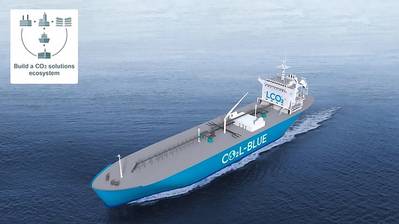The Path to Zero: Mitsubishi Shipbuilding, TotalEnergies Study LCO2 Carrier
Mitsubishi Shipbuilding has initiated a feasibility study with TotalEnergies for the development of a liquefied CO2 (LCO2) carrier, a key plank in the CO2 ecosystem as carbon dioxide capture, utilization, and storage (CCUS) attracts increasing attention worldwide.
An LCO2 carrier would play a pivotal role in transporting CO2 from its emission sources to storage sites or facilities for utilization, and demand for these vessels is expected to increase in the future.
Mitsubishi Shipbuilding is actively pursuing commercialization of LCO2 carriers, and this project is expected to make a significant contribution to the establishment of a CO2 ecosystem in the CO2 transport sector, which will be an essential component of the CCUS value chain.
“We are pleased to partner with Mitsubishi, whose expertise in shipbuilding is well proven, in order to study large tonnage liquid CO2 carrier opportunities," said Bruno Seilhan, Vice President CCUS at TotalEnergies. "Such vessels will be key to accommodate the expected surge in transported CO2 volumes for geological storage triggered by the acceleration in net zero carbon targets worldwide and to meet world industrial emitters’ needs. It is fully aligned with our Climate Ambition to get to net zero emissions by 2050.”
"We believe that LCO2 carriers are an effective solution for achieving a decarbonized world," said Toru Kitamura, President of Mitsubishi Shipbuilding." We will continue to actively pursue technology development in cooperation with partners seeking to achieve decarbonization using LCO2 carriers, with the aim of market formation for the CCUS value chain.”
 The project part of MHI Group’s effort to expand businesses for the CCUS value chain, utilizing the advanced gas handling technologies of Mitsubishi Shipbuilding. Image courtesy Mitsubishi Shipbuilding
The project part of MHI Group’s effort to expand businesses for the CCUS value chain, utilizing the advanced gas handling technologies of Mitsubishi Shipbuilding. Image courtesy Mitsubishi Shipbuilding

